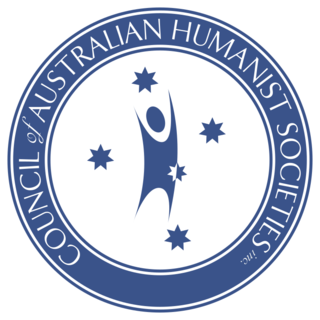Related Research Articles
Secularism is the principle of being indifferent to or skeptical and/or critical of religious belief.

Secular humanism is a philosophy, belief system or life stance that embraces human reason, logic, secular ethics, and philosophical naturalism, while specifically rejecting religious dogma, supernaturalism, and superstition as the basis of morality and decision making.

Religious humanism or ethical humanism is an integration of nontheistic humanist ethical philosophy with congregational rites and community activity which center on human needs, interests, and abilities. Self-described religious humanists differ from secular humanists mainly in that they regard the nontheistic humanist life stance as a non-supernatural "religion" and organising using a congregational model.

Humanists UK, known from 1967 until May 2017 as the British Humanist Association (BHA), is a charitable organisation which promotes secular humanism and aims to represent "people who seek to live good lives without religious or superstitious beliefs" in the United Kingdom by campaigning on issues relating to humanism, secularism, and human rights. It seeks to act as a representative body for non-religious people in the UK.

Humanist Manifesto is the title of three manifestos laying out a humanist worldview. They are the original Humanist Manifesto, the Humanist Manifesto II (1973), and Humanism and Its Aspirations. The Manifesto originally arose from religious humanism, though secular humanists also signed.
A Humanist Manifesto, also known as Humanist Manifesto I to distinguish it from later Humanist Manifestos in the series, was written in 1933 primarily by Raymond Bragg and published with 34 signers. Unlike the later manifestos, this first talks of a new religion and refers to humanism as "the religion of the future." Nevertheless, it is careful not to express a creed or dogma. The document outlines fifteen affirmations on cosmology, biological and cultural evolution, human nature, epistemology, ethics, religion, self-fulfillment, and the quest for freedom and social justice. This latter, stated in article fourteen, proved to be the most controversial, even among humanists, in its opposition to "acquisitive and profit-motivated society" and its demand for an egalitarian world community based on voluntary mutual cooperation. The document's release was reported by the mainstream media on May 1, simultaneous with its publication in the May/June 1933 issue of the New Humanist.

Humanists International is an international non-governmental organisation championing secularism and human rights, motivated by secular humanist values. Founded in Amsterdam in 1952, it is an umbrella organisation made up of more than 160 secular humanist, atheist, rationalist, agnostic, skeptic, freethought and Ethical Culture organisations from over 80 countries.
Secular ethics is a branch of moral philosophy in which ethics is based solely on human faculties such as logic, empathy, reason or moral intuition, and not derived from belief in supernatural revelation or guidance—a source of ethics in many religions. Secular ethics refers to any ethical system that does not draw on the supernatural, and includes humanism, secularism and freethinking. A classical example of literature on secular ethics is the Kural text, authored by the ancient Indian philosopher Valluvar.

The Council of Australian Humanist Societies (CAHS) is an umbrella organisation for Australian humanist societies. It was founded in 1965. It is affiliated with Humanists International. The official symbol of CAHS is the Happy Human.

The Amsterdam Declaration 2002 is a statement of the fundamental principles of modern Humanism passed unanimously by the General Assembly of Humanists International (HI) at the 50th anniversary World Humanist Congress in 2002. According to HI, the declaration "is the official statement of World Humanism."

The Humanist Institute is a training program for leaders within the humanist, and secular humanist movement.
Fellowship of Humanity v. County of Alameda was a 1957 California Courts of Appeal case in the Fellowship of Humanity, an organization of humanists, sought a tax exemption from Alameda County, California on the ground that they used their property "solely and exclusively for religious worship." Despite the group's nontheistic beliefs, the court determined that the activities of the Fellowship of Humanity, which included weekly Sunday meetings, were analogous to the activities of theistic churches and thus entitled to an exemption.

Humanism is a democratic and ethical life stance, which affirms that human beings have the right and responsibility to give meaning and shape to their own lives.

The following outline is provided as an overview of and topical guide to humanism:
Moral syncretism consists of the attempt to reconcile disparate or contradictory moral beliefs, often while melding the ethical practices of various schools of thought.

The Tyneside Group of the North East Humanists (NEH) was founded on 17 September 1957, although organised secularism in North East England had been active from the 1860s. The group adopted the name North East Humanists in 1997, after merging with the Teesside Humanist group.

Andrew James William Copson is a humanist leader and writer. He is the Chief Executive of Humanists UK and the President of Humanists International. He has worked for a number of civil and human rights organisations throughout his career in his capacity as executive committee member, director or trustee and has represented Humanist organisations before the House of Commons, the Organization for Security and Co-operation in Europe and the United Nations. As a prominent spokesperson for the Humanist movement in the United Kingdom he is a frequent contributor to newspaper articles, news items, television and radio programmes and regularly speaks to Humanist and secular groups throughout Britain. Copson has contributed to several books on secularism and humanism and is the author of Secularism: Politics, Religion, and Freedom.

The Birmingham Humanist Group was formed on 23 May 1962 at the Arden Hotel, New Street, Birmingham, England, at a meeting convened by Dr Anthony Brierley. It changed its name to Birmingham Humanists in 2000 and voted to become a Partner Group of the BHA, which changed its name to Humanists UK in 2017. It holds most of its meetings at the rooms of the Community Development trust in Moseley, Birmingham.
Harry Verdon Stopes-Roe was a British philosopher known mainly for his active role in the humanist movement in Britain and around the world. He was a Vice-President of the British Humanist Association until his death in May 2014, having served as its Chair previously.
Norway is a comparatively secular nation which no longer has a state religion, though 68.7% of the 5.4 million population belong to the Church of Norway.
References
- ↑ For example, as treated in The Intentional Stance by Daniel Dennett ISBN 0-262-54053-3
- 1 2 3 4 Stopes-Roe (1988a, p. 21)
- ↑ On "life stance education" see Stopes-Roe (1976), and Stopes-Roe (1983). Compare with the advocacy of "Education in Life Stances" in Cox (1975), on which also see Greer (1985, pp. 16–17)). The British Humanist Association pamphlet, Objective, Fair and Balanced (1975), includes the text of a letter by Stopes-Roe, printed in the Times Educational Supplement of 12 July 1974, which refers to "stances for living". It also cites the City of Birmingham's Agreed Syllabus of Religious Education, dated 7 May 1974: "it introduces the new term "stance for living". (British Humanist Association, 1975, p. 15). For the related "life stance education" offered to non-religious pupils in Finland, see Slotte (2008).
- ↑ Barnes (2008, p. 75), notes that the controversy reached Parliament. Hull (1984, p. 111) notes that "an attempt was made in the spring of 1976 to introduce a Private Members Bill into the House of Commons which would have replaced religious education by 'Education in Stances for Living'". The Bill was published in "Objective, Fair and Balanced – a new law for religion in education", written by Harry Stopes-Roe and David Pollock for the British Humanist Association (1975)
- ↑ Barnes (2008, p. 75)
- ↑ Stopes-Roe's advocacy of the term outside the literature of religious education was first published as Stopes-Roe (1987), but the article was in circulation at a Board meeting of the International Humanist and Ethical Union in October 1987 (See Walter 1988a, p. 4). The article was reprinted in New Humanist (Stopes Roe 1988a) and Kurtz (1989). Stopes-Roe revisited the subject in Stopes-Roe (1996), and wrote the article on "Life stance" for the New Encyclopedia of Unbelief (Stopes-Roe 2007). See also the statement "Humanism is eight letters, no more", signed by Harold Blackham, Levi Fragell, Corliss Lamont, Harry Stopes-Roe, and Rob Tielman.
- ↑ Stopes-Roe (1988a, p. 21) commented that "I have found the degree of opposition to the term "life stance" among Humanists more surprising than the religionist's objection." See also the overview of the debate between Walter (1988a and 1988b) and Stopes-Roe (1988a and 1988b) in Fowler (1999 pp. 3–4).
- ↑ See "Humanism is eight letters, no more"
- ↑ Stopes-Roe (1988a, p.19)
- ↑ Memorandum from the BHA to the Charity Commission on Religion and Non-Religious Beliefs in Charity Law, August 2007: see http://www.humanism.org.uk/documents/3917
- ↑ Humanism Unmodified Archived 2008-05-05 at the Wayback Machine By Edd Doerr. Published in the Humanist (November/December 2002)
- ↑ Durkheim 1976, p. 36
- ↑ Cooke 2003 (p. 223)